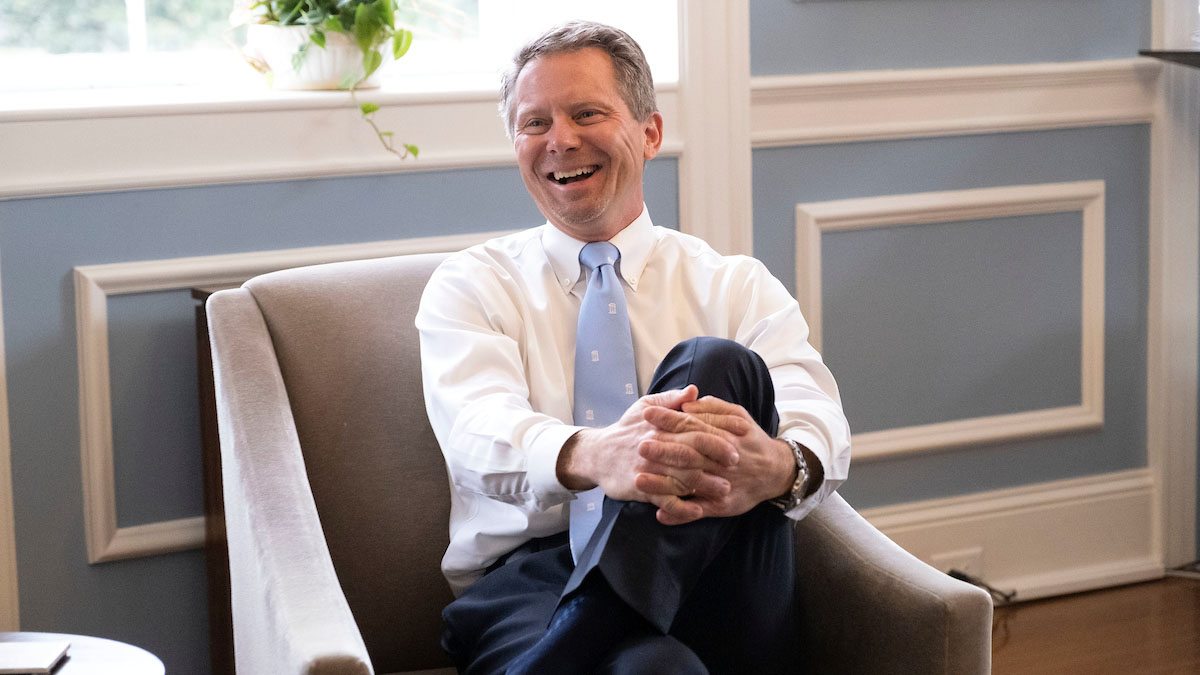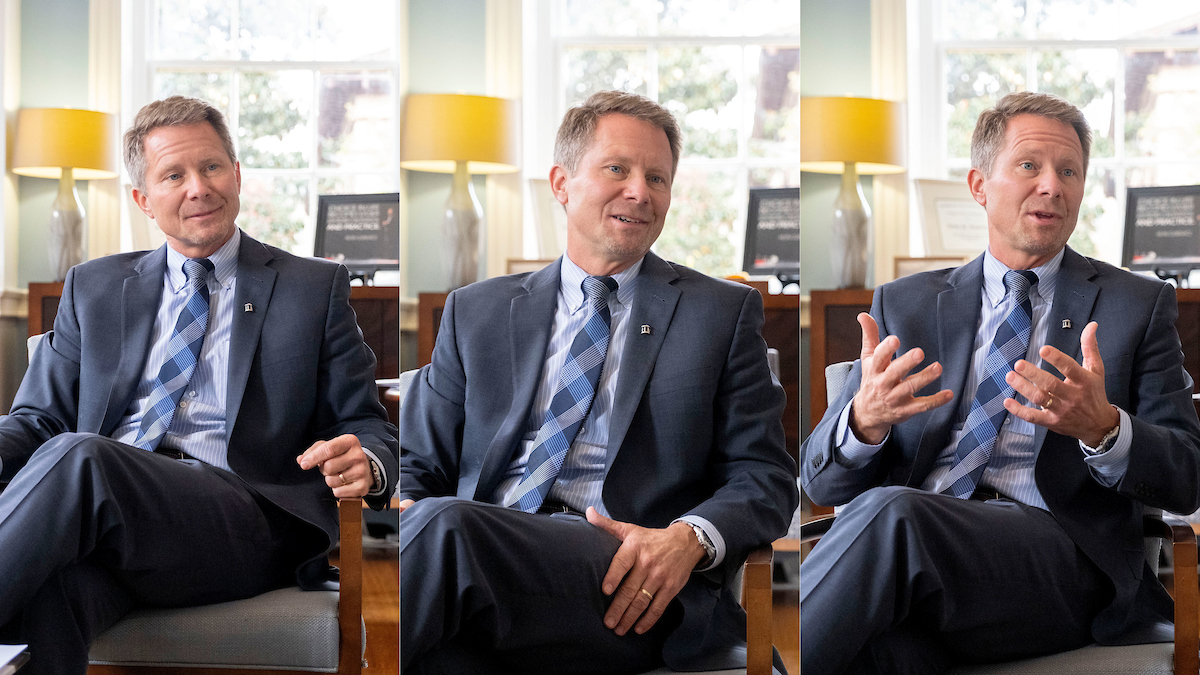In his own words
As he prepares to be installed as Carolina’s 12th chancellor on Sunday, Kevin Guskiewicz discusses tradition, uncertainty and the importance of inclusive decision-making.

The chancellor’s installation this Sunday, Oct. 11, will be unlike any that has come before, an intimate affair for family, friends and colleagues that will be livestreamed on YouTube. Sunday kicks off a creative — and largely virtual — two-day University Day observance.
During a time that is historic on multiple levels, The Well spoke with Guskiewicz to find out what’s on his mind and in his heart.
On Sunday, you’ll be installed as the 12th chancellor of the oldest public university in the country. How are you feeling?
I feel good. There’s a lot of uncertainty out there. But, having been at Carolina for 25 years, I think I benefit from knowing and understanding this magical place, as I like to call it.
By now, I’ve been in the job either as interim chancellor or chancellor for about 20 months, so I know the job, and I think I understand the responsibility that I’ve accepted. I feel good knowing that we have incredibly talented, motivated and caring people who are committed to moving Carolina forward into the future with boldness and confidence. I think that our work will remain vital for the people in North Carolina and the nation and the world. That’s what we’re about.
There won’t be crowds of people at your installation. Does it help you relate to what graduating seniors went through last spring?
It does. One of those seniors was my own son, Nathan. I still feel bad for the 2020 graduates who have not yet been celebrated in the traditional way that a Kenan Stadium commencement ceremony allows. We’re going to find a way. Our commencement planning committee is meeting to discuss how we can honor these students.
We said this would be a Carolina fall semester like none other in our 227-year history. This will be true of University Day and the installation. I’m disappointed that our campus community can’t celebrate University Day this fall in the way that it brings everyone together. We typically showcase the accomplishments of our world-class faculty and our dedicated staff, and we honor our distinguished alumni who are making great change for our nation and impacting society in such important ways. But we’re improvising, and I think our teams put together a wonderful program for installation and University Day. I think we’ve all accepted this new world that we’re living in. We adjust to it daily.
The installation involves lots of regalia and rituals. Is there anything especially meaningful to you?
It’ll be important for me to have family, close friends and colleagues there to share in the special day, even though I know it’ll be limited given the gathering restrictions that we have.
Those people know me best and have supported me along my journey. They also know how much I love and care for this incredible place. That will be what I’ll likely remember, being surrounded by those people who supported me along the way.
Michael Jordan famously wore his Tar Heels practice shorts under his Chicago Bulls uniform for good luck. Will you be wearing anything special under your robe?
I’m not very superstitious, but I am very loyal to my hometown sports teams. I enjoy occasionally wearing the black and gold of my hometown Pittsburgh Steelers. But I love Carolina Blue, and I think that’s the color of choice for University Day and installation.
What were your top goals when you became chancellor, and have they changed since the pandemic hit?
We were in the midst of developing our strategic plan, Carolina Next: Innovations for Public Good. I became interim chancellor in February of 2019 and chancellor in December of that year. I was really proud when the Board of Trustees fully endorsed this great plan for the University at the end of January 2020. Then, five weeks later, the pandemic hit.
After that, I wanted to be sure that we didn’t lose momentum. There are eight strategic initiatives, and with at least half of those I think we’ve made good progress, even over these difficult past six months.
We’ve lost a little momentum with a few of them because of all the uncertainty and travel restrictions. For example, globalize. Carolina aspires to be the leading global public university. We’re passionately public — the most public of the publics. We show that in so many ways. We’re having our best year ever in research. By the end of this academic year, we’ll have surpassed $1 billion in research expenditure. The impact of that research is tremendous. And I think we have great opportunities to really become that global university. We moved up in the global rankings this year, three spots in the Shanghai rankings, and that’s really important. But we have work to do.
We said all along Carolina Next would be a living document that could be modified as need be. We’ve been taking steps to COVID-ize it, if you will. Bob Blouin and the advisory committee are coming back with some recommendations about how we can find other opportunities within those eight strategic initiatives and the 24 objectives nested within them. We’re adjusting.
Tell us about your leadership style.
I believe in surrounding myself with good people, people who are going to challenge me to think differently, people who come from different backgrounds and different experiences. I think that’s what we have as a leadership team, a group that’s always challenging one another.
As I said on December 13, when I was named chancellor, I believe Carolina needs a servant leader, and that means making decisions alongside one another. I think an inclusive approach to decision-making is important. We can always be more inclusive, and we’re finding ways to do that. That’s what drives me — being a good listener but knowing that at the end of the day somebody has to make a decision. I believe in trying to make decisions in an informed way, a hypothesis-driven approach. I make decisions as a leader much in the same way that I do as a researcher — by putting a method in place to study the problem, gathering a lot of information, processing that information and then making a decision.
Considering the many changes forced by the pandemic, how will Carolina continue to be a leading public research institution?
On the curricular side, it’s trying to expand our footprint so that more people across North Carolina and across the nation can have access to our world-class faculty and our researchers. And we’re doing that. We’re teaching more students right now at Carolina this fall than ever in the history of the University. Who would have thought that?
We have something that a lot of people want access to. While many of our faculty had never taught remotely before, I think they learned quickly that they can do it, and they can do it well. We’re continuing to look at ways we can deliver that quality education beyond the residential program here on campus.
We created a program called Carolina Away, which we had been talking about for probably a year and a half — offering more digital learning opportunities — but we had to expedite that. We have about 700 students that are part of Carolina Away this semester. The program allows them to get at least 15 credit hours this fall entirely online. There are Carolina Away learning communities that allow students to work in groups and to meet one another and to feel more connected to Carolina than just jumping onto the computer every day and taking a class as a one-off.
And we’re also bringing activities to them, events from Student Affairs. There are over 300 different events and club activities that are virtually connecting students to the campus. Most are first-year students, transfer students or international students. Most of them haven’t officially been here living on campus. Carolina Away allows us to expand our footprint, bring Carolina to them, so that when they do get here — hopefully in the spring semester — they’ll feel like they haven’t missed as much as maybe they would have otherwise.
Let me also add that part of the Carolina Away program includes a series of what are called COVID-19 Investigation Courses that are being taught by some of our star faculty who study pandemics and disease, epidemiologists who study these trends and track these viruses and diseases. That program is opening our students’ eyes to this grand challenge of our time.
On the research side, we’re taking members of our faculty, such as our HIV researchers, and they’re shifting their focus. They’re bringing their expertise in studying HIV and Ebola and the way they spread to this relatively new coronavirus pandemic. And we’re leading in this space. Microsoft Academia, back in April, ranked us as the number one university in the country having the biggest impact on COVID-19.
These past six months have been quite a journey. I think we’ve done a lot of good things. We’ve learned from some things that didn’t work. My goal is to keep people focused on the road in front of us.




